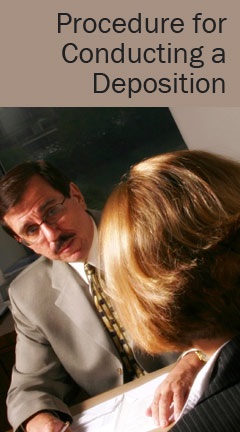Archival Notice
This is an archive page that is no longer being updated. It may contain outdated information and links may no longer function as originally intended.
Home | Glossary | Resources | Help | Course Map
Testimony is a way of conveying information from the expert as a specialized witness to the judge, jury or dispute resolution body that will decide the case.
Deposition is a form of testimony under oath. At deposition, the expert may be asked questions by lawyers representing either side of the case. Most often, opposing counsel conducts the deposition and questions the expert. A court reporter may record the witness's answers in shorthand or on a stenographic machine, or the deposition may be videotaped for later transcription.
A deposition may last from 20 to 30 minutes, to several hours, to a day or more, depending on the:
- Complexity of the case.
- Complexity of the expert's role in the case.
- Degree of detail to which opposing counsel wishes to explore.
Generally, those present at a deposition are the attorneys for both parties, a court reporter, the expert witness and sometimes a videographer. The deposition examination is usually conducted by opposing counsel. Few, if any, questions are asked by the proffering attorney. The other parties are typically present only to observe. The proffering attorney is often silent, but he may interject, interrupt, offer caution, comment or object for the record, if and when appropriate.
Juries and judges are never present at a deposition. Because there is no judge present to rule on conflicts, even if the proffering attorney objects to a question, the witness must answer. Whether the answer can be used later at trial may have to be resolved through a subsequent motion.
The deposition setting is generally informal, scheduled in advance, and conducted in the presence of a certified court reporter. Recording by video, as well as stenographic transcripts, is common.
The deposition location is most often a law office conference room or the expert's place of work. The physical location is usually determined by counsel ordering the deposition and selected to accommodate experts and other witnesses as well as counsel. Depositions may take place in a predetermined hotel conference room, if that is agreed upon as more convenient for all parties.
Unless the deposition occurs at the expert's place of work, it will usually involve some degree of travel for the expert, either within the general area where the expert works and resides or sometimes out of town, depending on the location and jurisdiction of the proffering entity (city, county, municipality, state, federal).
The entire deposition proceeding is later transcribed and made available in hard copy form for the expert's review and approval. Changes to the deposition transcript should be made by the expert to correct transcription errors.
The expert may also be asked to assist the examining attorney at the deposition of opposing experts: by assessing their qualifications, capabilities and demeanor, and by framing questions for them. This assessment may occur at the physical deposition of opposing experts or, later, by reviewing their deposition transcripts.
Additional Online Courses
- What Every First Responding Officer Should Know About DNA Evidence
- Collecting DNA Evidence at Property Crime Scenes
- DNA – A Prosecutor’s Practice Notebook
- Crime Scene and DNA Basics
- Laboratory Safety Programs
- DNA Amplification
- Population Genetics and Statistics
- Non-STR DNA Markers: SNPs, Y-STRs, LCN and mtDNA
- Firearms Examiner Training
- Forensic DNA Education for Law Enforcement Decisionmakers
- What Every Investigator and Evidence Technician Should Know About DNA Evidence
- Principles of Forensic DNA for Officers of the Court
- Law 101: Legal Guide for the Forensic Expert
- Laboratory Orientation and Testing of Body Fluids and Tissues
- DNA Extraction and Quantitation
- STR Data Analysis and Interpretation
- Communication Skills, Report Writing, and Courtroom Testimony
- Español for Law Enforcement
- Amplified DNA Product Separation for Forensic Analysts


